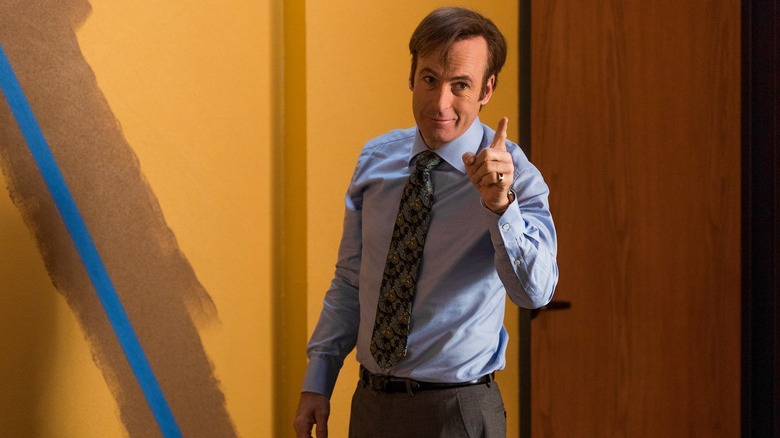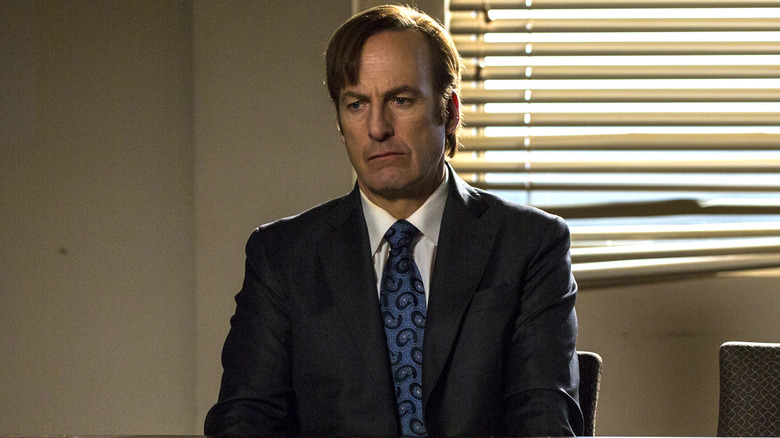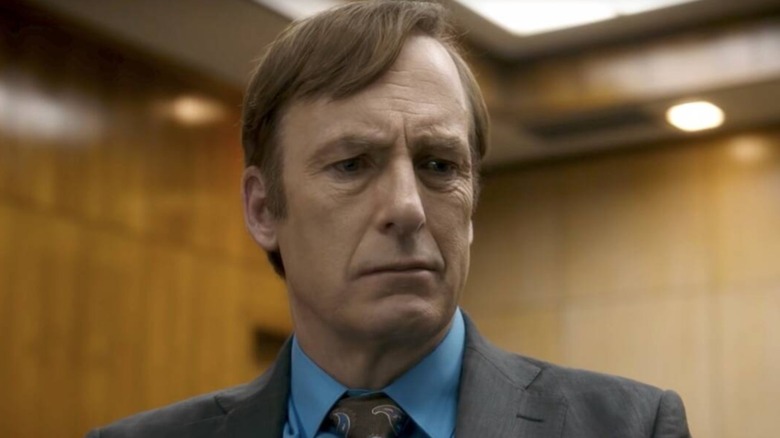Bob Odenkirk Built Saul Goodman Around A Dark Part Of His Past
When the character of Saul Goodman first turned up on "Breaking Bad," he was seen as an injection of comic relief into the increasingly dramatic series if for no other reason than his being portrayed by actor Bob Odenkirk. Before his appearance on the show, Odenkirk had been most well known for his storied comedy career, being an integral part of series like "The Larry Sanders Show," "The Ben Stiller Show," and "Mr. Show with Bob and David."
However, as "Breaking Bad" developed and Saul was eventually spun off into his own prequel series, "Better Call Saul," Odenkirk started to show more facets of himself as a performer, allowing fans and critics to see not only his depth as an actor, but the shades of darkness in his past comedic turns. The tone of "Saul" even followed the character as it performed a delicate balancing act. This was no accident: the character of Saul became a direct conduit to a troubling portion of the actor's real-life past, a darkness that not only enriched and deepened the character, but also informed Odenkirk's work as a performer in general, leading to his persona becoming more multifaceted as a result.
'A pretty disconnected guy' — Odenkirk's troubled relationship with his late father
As seen in "Breaking Bad" and even more so in "Better Call Saul," Jimmy McGill — the man who would be Saul — is a guy with a good heart who nonetheless keeps finding himself slipping, literally and figuratively. This also describes Odenkirk's father, Walter, a man who apparently suffered from alcoholism and depression, leaving a haunting impression on his family as a result.
According to Odenkirk in an interview from February 2022, growing up in the small town of Berwyn, Illinois as one of seven children had its bright spots. It was where the actor caught the acting bug, putting on little performances at the dinner table that his mother, Barbara, "would absolutely indulge." In fact, she "would encourage it." Such levity was important to Odenkirk and his family, due to their home having "a tension running through it" due to Walter having issues "struggling with existence."
Odenkirk describes Walter as "a pretty disconnected guy," someone who seemed to go through life not realizing the harm he was doing. Apparently, Walter would get into various sorts of trouble, everything from car accidents to losing the family's money to straight up disappearing at times. These incidents made the young Odenkirk more angry than anything else, leading to an actual altercation between father and son. As Odenkirk recalls, "One time I got to confront my father physically. It was a great feeling. And that's kind of sad, and horrible."
Even more unfortunate than their fight was the fact that son and father never really got a chance to reconcile. As Odenkirk recalled in 2013, the year he turned 21 his father "developed terminal bone cancer and he came home. I did try to connect with him, but it just didn't happen." Walter's ultimate death became "a shrugging affair," in Odenkirk's words, with the son still in the dark about what was really behind his father's behavior: "I don't know what his story was," he said.
From Slippin' Jimmy to Nobody, Odenkirk's father resonates through his work
Odenkirk is well-aware that his experiences with his father have crept into his acting, beginning even in his early comedy days. The actor filtered these formative encounters into finding "trouble with authority, and a desire to look at problems and shout about them, and make fun of them." In his sketch comedy work, Odenkirk does tend to excel playing characters with exaggerated, shout-y arrogance; fans have picked up on this to the point there's even a supercut of just him yelling in sketches from "Mr. Show."
There's also the matter of "Nobody," the 2021 film that cast Odenkirk in the seemingly unlikely role of gritty action movie star. While his image as a comedian made his casting somewhat confusing at first, it turned out that Odenkirk could not only credibly dish out punches and kicks but that the film played to the deep well of anger and sadness within him caused by his time with his father.
While a number of Odenkirk's characters have elements of his relationship with father in them, Jimmy McGill/Saul Goodman seems to directly engage with the actor's lingering issues with Walter. As seen throughout "Better Call Saul," Jimmy/Saul's true self and sense of morality aren't easy to pin down, his constant boisterous performances in public (and even in private) a well-constructed mask that hides a deep well of hurt, shame, and insecurity. Jimmy often gets himself into huge messes in similar fashion to Odenkirk's father, and occasionally reveals his emotional scars beneath, such as in this scene from season 5. As Odenkirk admits that "I don't feel like I've ever met anyone like [my father]," he pours such confusion and contradiction into the character of Jimmy, a deeply flawed and troubled person whose destiny — as we know from his appearance in "Breaking Bad" — is to make himself into someone else, a facsimile that further complicates and obscures whoever the real man is beneath.
As with all things Saul Goodman, the truth is frequently not all good, man.


